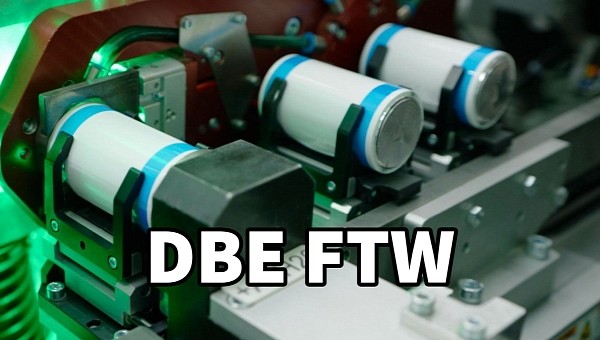Tesla's battery pains are caused by the problematic dry battery electrode (DBE) process that is still not production-ready. Tesla aims to speed up its development by hiring a battery expert to lead the efforts in the right direction. Matt Tyle has previously worked for a battery startup that pioneered "semi-solid Li-ion cells."
Although Elon Musk claimed that patents stifle innovation, Tesla has an impressive portfolio. Many of those patents have been granted for discoveries made by its engineers and researchers or by associate scientists at different universities across North America. On the other hand, some of them have been bought, sometimes with the companies that owned them. The most famous of them is probably the dry battery electrode (DBE) manufacturing process, which Tesla acquired when it bought Maxwell Technologies in 2019.
The DBE process was the sole reason Tesla had any interest in Maxwell, and it later resold the company sans the patents related to the revolutionary manufacturing process. Maxwell developed the dry electrode process for supercapacitors, but Elon Musk thought it could also be transplanted into Li-Ion batteries. Musk may have jumped the gun here because it sold the 4680 cells to investors in 2020 as a revolutionary cell based on the DBE tech. We're in 2023, and the 4680 cells still don't feature DBE, as has been revealed.
The promising technology is, in Musk's words, "a key piece of the puzzle for lowering costs of lithium batteries." Dry electrodes eliminate several time-consuming and chemical-heavy operations from the manufacturing process, but the technology is still not ready for mass production. Tesla recently filed a flurry of patents related to DBE, which indicates that the development has accelerated. Now, the EV maker has hired new talent to lead the development.
Matt Tyler, a battery expert with an impressive background in Li-ion battery development, was recently named "director of Dry Electrode Development" at Tesla. The EV maker already had an R&D director for the dry battery electrode process, Hieu Duong, who got at Tesla with the acquisition of Maxwell Technologies. Hieu Duong hasn't updated his LinkedIn profile, so it's hard to tell how the change affected him or his work.
Matt Tyler has worked for over six years at 24M Technologies, a startup that wants to develop semi-solid Li-ion cells for energy storage. Based on his LinkedIn profile, Tyler has been responsible for developing semi-solid lithium-ion batteries manufacturing engineering. 24M Technology has designed no-binder electrodes to enable a simpler manufacturing process, which resembles what Tesla is trying to achieve with the dry battery electrode process (h/t to Electrek for the information).
Tyler's experience in manufacturing should prove critical for Tesla's ability to mass-produce the 4680 cells using the DBE technology. Tesla is setting up a new battery production facility in Nevada to produce the 4680 cells for the Semi production. Tesla Cybertruck is also planned to use the cells, which will eventually get into all Tesla products, from Powerwall to robots.
The DBE process was the sole reason Tesla had any interest in Maxwell, and it later resold the company sans the patents related to the revolutionary manufacturing process. Maxwell developed the dry electrode process for supercapacitors, but Elon Musk thought it could also be transplanted into Li-Ion batteries. Musk may have jumped the gun here because it sold the 4680 cells to investors in 2020 as a revolutionary cell based on the DBE tech. We're in 2023, and the 4680 cells still don't feature DBE, as has been revealed.
The promising technology is, in Musk's words, "a key piece of the puzzle for lowering costs of lithium batteries." Dry electrodes eliminate several time-consuming and chemical-heavy operations from the manufacturing process, but the technology is still not ready for mass production. Tesla recently filed a flurry of patents related to DBE, which indicates that the development has accelerated. Now, the EV maker has hired new talent to lead the development.
Matt Tyler, a battery expert with an impressive background in Li-ion battery development, was recently named "director of Dry Electrode Development" at Tesla. The EV maker already had an R&D director for the dry battery electrode process, Hieu Duong, who got at Tesla with the acquisition of Maxwell Technologies. Hieu Duong hasn't updated his LinkedIn profile, so it's hard to tell how the change affected him or his work.
Matt Tyler has worked for over six years at 24M Technologies, a startup that wants to develop semi-solid Li-ion cells for energy storage. Based on his LinkedIn profile, Tyler has been responsible for developing semi-solid lithium-ion batteries manufacturing engineering. 24M Technology has designed no-binder electrodes to enable a simpler manufacturing process, which resembles what Tesla is trying to achieve with the dry battery electrode process (h/t to Electrek for the information).
Tyler's experience in manufacturing should prove critical for Tesla's ability to mass-produce the 4680 cells using the DBE technology. Tesla is setting up a new battery production facility in Nevada to produce the 4680 cells for the Semi production. Tesla Cybertruck is also planned to use the cells, which will eventually get into all Tesla products, from Powerwall to robots.







